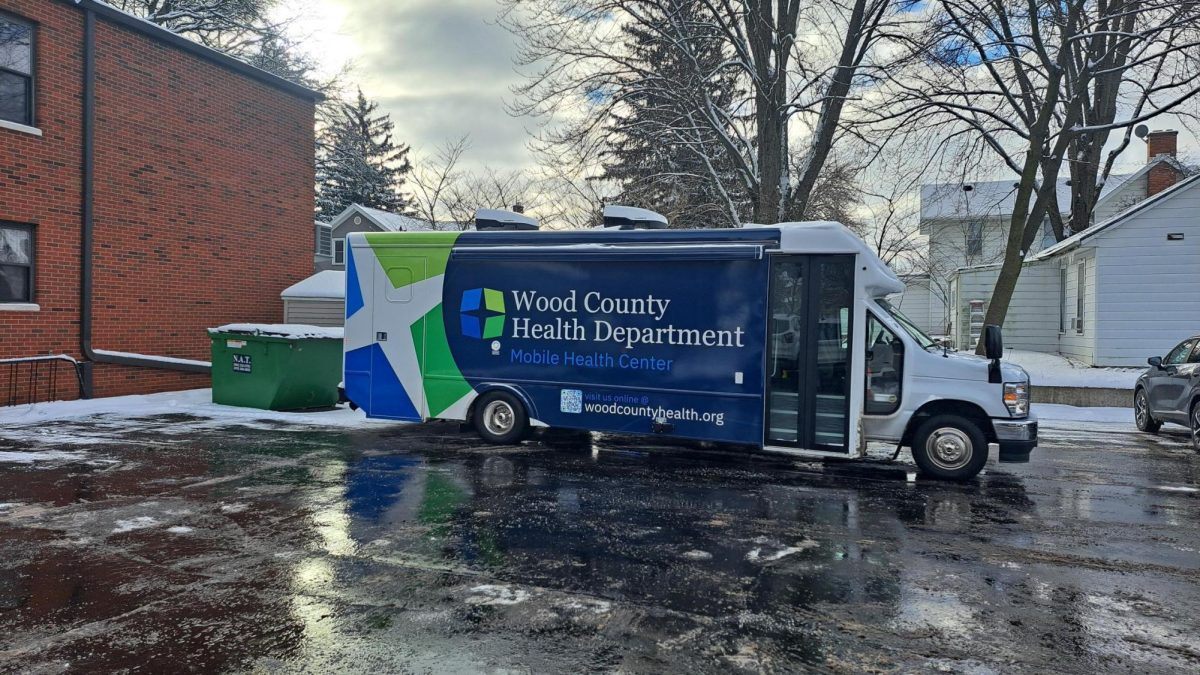“Whose got the marijuana?”
This is what Patrolman Gordon Finger of the Bowling Green Police Division said as he tapped on the fogged-up window of a parked car.
It’s a Friday night at 11:15 p.m. Four people sit in the smokey car in the parking lot behind 504 N. Enterprise St.
“If you’re sitting in a parking lot late at night, you’re usually doing stuff you shouldn’t be,” Finger said, prior to discovering the vehicle while on patrol.
The hands of the student in the drivers seat shake as he gives Finger, a 15-year veteran with the police, the glass pipe sitting in the console.
The student claims it’s his and recieves a citation for possession of marijuana and possession of drug paraphernalia. If no one claimed responsibility, all four would have been cited.
“I’m not mad,” the student said as received the ticket. “I made my choices. I understand what I did was wrong.”
The tension fades and the conversation gets lighter.
“Some get nervous, some get hostile,” Finger said after the citation. “We usually try to tone it down. We already have to give them a ticket.”
Depending on the night, Finger usually writes between two and three citations a shift. He usually works 8 p.m to 4 a.m. from Thursday through Monday.
Finger enjoys the late night shift because of the variety and he is able to spend more time with his family.
“Everyday is different,” he said. “The student population keeps us popping, but it slows down in the summer. As soon as they get back it’s non-stop for a couple of weeks.”
From August to September, police have made 821 arrests and citations compared to 470 between June and July, according to monthly police crime reports.
“I don’t know how some kids do it,” Finger said. “It’s expensive to go out. When I was in college, I couldn’t afford to go out all the time.”
Finger graduated from The University of Toledo and worked investigations for Huntington Bank before coming to Bowling Green. Law enforcement, he said, has always interested him since his dad was a deputy sheriff in Van Wert County, where he is from.
“I would enjoy listening to the stories he would tell,” Finger said. “A lot of people see the excitement in this job.”
With 15 years under his belt with the police, Finger now has his own stories to tell.
“When I first started working here 15 years ago, we were a lot busier than we are now,” he said. “You couldn’t finish writing a ticket for open container without someone walking right by you with another one.”
Police also had more staff than they do now.
During Finger’s Friday night patrol, only five officers were working— three in police cruisers and two on foot downtown.
Police have had five less officers than in past years due to a shrinking budget. Another two are currently on leave— one had a child, the other is suspended, said Maj. Tony Hetrick, deputy chief of police.
“If we had 10 officers working, we’d be writing tickets left and right,” Finger said as he drives down North Main Street past flocks of drunk people jay walking past his cruiser.
The only problem is there is no room on the budget, which Lori Tretter, city public information officer, calls “very challenged since 2008” considering the recession.
This is due to a reduction in the local government fund from the state, giving the city $2 million less than it had in 2009, said John Fawcett, municipal administrator.
The police budget this year is much less than it was five years ago, which did account for reduced officers, Tretter said. In 2009, police had a budget of $5.46 million compared to $5.26 million.
When police retired, their positions were not filled, leaving those five vacancies. Police recently hired three officers, who after training will be on patrol by May, Hetrick said.
“Yeah, it sometimes happens where we are stretched pretty thin,” Hetrick said in regards to staff. “But that’s when we rely on our mutual aid agreement and the BGSU police can help us out.”
After salaries and benefits are paid, that leaves police with an operating budget of $450,000, Hetrick said. That money then goes to maintenance, supplies and contracts.
Some of these costs usually have to be delayed, such as buying new vehicles, which only last police roughly five years. A few vehicles in the police garage have been in use for seven or nine years, Hetrick said.
“You have to do more with less,” he said.
That applies to operations and staffing as police rely on overtime hours to make up for a shorter staff. Currently, police have clocked in 3,106 overtime hours, which Finger is no stranger to.
“I have two [high school] girls, they’re expensive,” Finger said, adding he’ll take overtime when it’s available. Recently, he worked the Florida Georgia Line concert and the Black Swamp Arts Festival.
Though his job is a lot of work, Finger said what has got him through 15 years is finding humor.
“You need humor,” he said. “You got to be able to go out and brush things off from someone yelling at you to calling you names. This is not the type of work to do if you hate doing it.”













